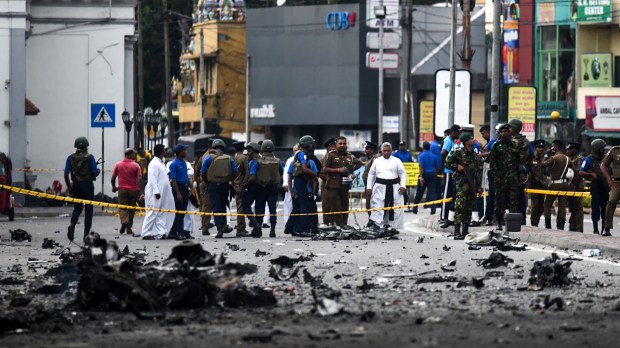Help Aleteia continue its mission by making a tax-deductible donation. In this way, Aleteia's future will be yours as well.
*Your donation is tax deductible!
The death toll in the Easter Sunday attacks on churches and hotels in Sri Lanka has risen to 359. As funerals continue, Sri Lanka remains on alert to the possibility of more terrorist attacks. Police continue to find explosives.
The death toll includes 45 children, according to the New York Times. About 500 persons were wounded.
The toll was highest at St. Sebastian’s Church in the seaside fishing town of Negombo, where about a third of victims died while attending Mass, the Associated Press reported. One 43-year-old woman there lost most of her family.
The Times reported Wednesday that Indian intelligence officials warned Sri Lanka of the possibility of an attack on churches, but that those warnings were never shared with churches in the island nation. There was another warning just hours before Sunday’s suicide bombings of three churches and three high-end hotels.
Cardinal Malcolm Ranjith, the Archbishop of Colombo, expressed concern that authorities had not acted immediately after receiving prior information of possible terror attacks, according to Vatican News.
“Strengthen the state intelligence services,” he told a press conference on Monday. “We were informed that the Easter Sunday attacks could have been avoided if the government had acted on the prior information.”
Cardinal Ranjith also urged citizens not to take the law into their hands and refrain from harming persons of other faiths.
The Islamic State group claimed responsibility for the attacks, but there has been little evidence to back up that claim. ISIS released a video showing Mohammed Zaharan, head of National Thowheeth Jama’ath, the obscure terrorist group that allegedly carried out the attacks, leading masked, black-clad disciples as they pledged allegiance to the Islamic State.
Sri Lanka’s state minister of defense, Ruwan Wijewardene, said investigators had found no evidence to suggest that the bombers had traveled to the Middle East to fight for ISIS.
Investigations by Sri Lanka officials have begun to paint a picture of the nine suicide bombers who carried out the attacks: All Sri Lankan, they came from mostly educated, middle-class backgrounds. At least one studied abroad.
Police spokesman Ruwan Gunasekara told reporters Wednesday that there was one husband and wife who took part in the attacks. The wife, he said, blew herself up along with her two children as police moved in to search a house they were in on Sunday afternoon, National Public Radio reported. Three police officers also died in that blast
Authorities said they have arrested 60 people so far but that other suspects remain at large. The F.B.I. is assisting in the investigation.
Alaina Teplitz, U.S. ambassador to Sri Lanka, said there were believed to be “ongoing terrorist plots,” the Times reported. Sri Lanka’s state minister of defense said the danger had not passed.
Defense minister Ruwan Wijewardene on Wednesday backed off claims that the Easter attacks were in retaliation for shootings last month at mosques in Christchurch, New Zealand. He told reporters that the mosque attacks may have been a motivation but that there was no direct evidence of that, NPR reported.

